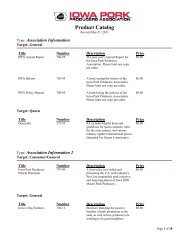Pork Congress 2012 - Iowa Pork Producers Association
Pork Congress 2012 - Iowa Pork Producers Association
Pork Congress 2012 - Iowa Pork Producers Association
You also want an ePaper? Increase the reach of your titles
YUMPU automatically turns print PDFs into web optimized ePapers that Google loves.
for the grower to rebut the alleged breach.<br />
• As noted in section 1 above, if the contractor<br />
intends to take an adverse action against the<br />
grower (including termination) because of<br />
a breach, one criteria of reasonableness is<br />
whether the grower was provided written<br />
notice of the breach when the contractor<br />
initially discovered the breach. This requires<br />
the contractor to balance maintaining a<br />
good working relationship with the grower<br />
by working to correct performance issues<br />
before sending written notice vs. complying<br />
with the rule.<br />
• If the contract has a clause allowing the<br />
contractor to take action against the grower,<br />
such as termination, if there is an environmental<br />
problem, that clause must be carefully reviewed<br />
to make sure there is a reasonable period of time<br />
for remedy by the grower.<br />
Arbitration<br />
This section applies to all livestock or poultry<br />
marketing or production contracts. A contract that<br />
requires arbitration must first have the following<br />
clause on the signature page of the contract in “bold<br />
conspicuous print:”<br />
“Right to Decline Arbitration. A poultry grower,<br />
livestock producer or swine production contract<br />
grower has the right to decline to be bound by the<br />
arbitration provisions set forth in this agreement.<br />
A poultry grower, livestock producer or swine<br />
production contract grower shall indicate whether<br />
or not it desires to be bound by the arbitration<br />
provisions by signing one of the following statements;<br />
failure to choose an option will be treated as if<br />
the poultry grower, livestock producer or swine<br />
production contract grower declined to be bound by<br />
the arbitration provisions set forth in this Agreement:<br />
I decline to be bound by the arbitration provisions set<br />
forth in this Agreement ____________<br />
I accept the arbitration provisions as set forth in this<br />
Agreement____________”<br />
Second, a contract that requires arbitration must also<br />
have a clause in bold conspicuous print that gives<br />
sufficient information about the following so that the<br />
grower or producer may make “an informed decision<br />
on whether to elect arbitration for dispute resolution:”<br />
1. Payment of the costs of arbitration<br />
2. The arbitration process<br />
3. Any limitations on legal rights and remedies<br />
Finally, an arbitration clause should be reviewed taking<br />
into account the following criteria:<br />
1. Whether arbitration costs and time limits are<br />
reasonable<br />
2. Whether the grower or producer is “provided<br />
access to and opportunity to engage in reasonable<br />
discovery of information” held by the other party<br />
3. Whether arbitration is required only for disputes<br />
under the contract<br />
4. Whether a “reasoned, written opinion based on<br />
applicable law, legal principles and precedent for<br />
the award is required to be provided to the parties”<br />
Under all three sections of the final rule, other than rule<br />
requirements that specifically require contract language,<br />
it is not clear when a violation of the rule would occur.<br />
Is a violation based on the contract language itself<br />
or is it when that contract language comes into play,<br />
such as when there is a breach of the contract? The<br />
safest course of action is to try to make sure contract<br />
language complies with the rule and then implement<br />
that contract language. However, it appears to be more<br />
critical to comply with the rule when a regulated event<br />
occurs, such as when an additional capital investment<br />
is required, when a breach of contract occurs, or when<br />
arbitration is required.<br />
Again, this final rule went into effect on Feb. 7, and<br />
applies to contracts “entered into, amended, altered,<br />
modified, renewed or extended” after that date. Existing<br />
contracts that are not “amended, altered, modified,<br />
renewed or extended” after Feb. 7 are not required to<br />
meet the requirements of the rule.<br />
There are and will continue to be many questions about<br />
what the language of the criteria in the final rule actually<br />
means. IPPA will provide additional information as<br />
these questions surface.<br />
As with any legal issue, producers should consult an<br />
attorney for individual legal advice.<br />
54 March <strong>2012</strong>













